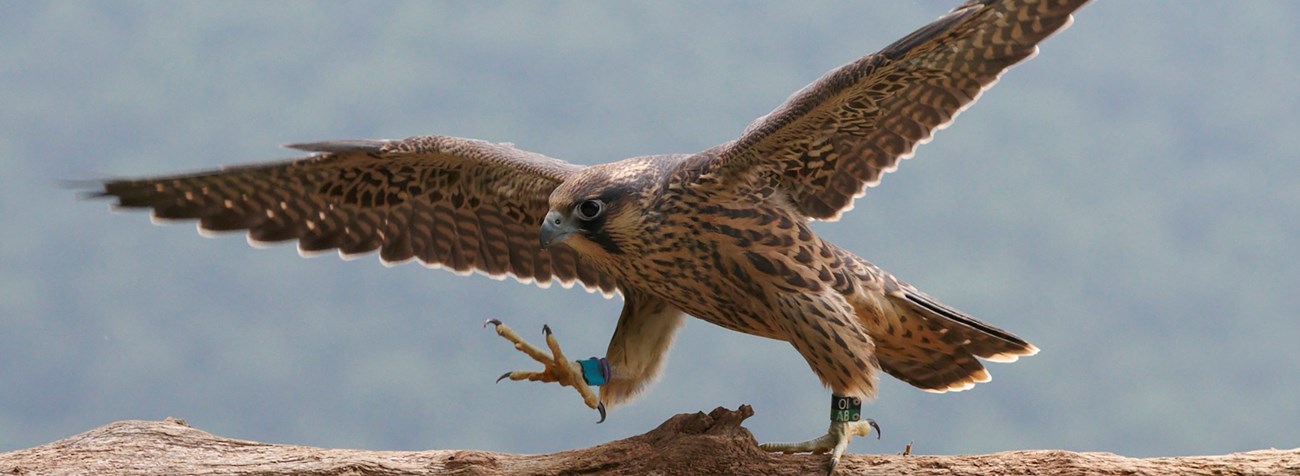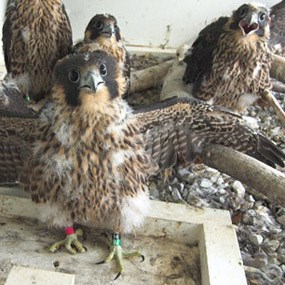
Gary Hartley National Park Service (NPS) and WV Department of Natural Resources (DNR) biologists have been "hacking" peregrine falcons within New River Gorge National Park and Preserve as part of a restoration program for the species. "Hacking is the process of placing young falcons in a structure and caring for the birds in a manner that minimizes human exposure until they are mature enough to fly," explained Matt Varner, NPS wildlife biologist. "The artificial aerie or hack box simulates nesting and feeding conditions on steep rock cliffs - prey is dropped into the box through a tube so the birds don't see or associate people with the food. This cage-like structure protects the birds from predators during the pre-flight period while allowing them to acclimate to and imprint on the gorge. When they are ready to 'fledge' (fly), they are released from the box, but will return for occasional feedings until their hunting skills allow them to survive on their own." 
Gary Hartley Peregrine falcons began to decline in the 1950s because of pesticide use, which disrupted eggshell formation and led to nest failure. "The species was officially listed as federally endangered from 1970 until1999 when recovery objectives were met in most regions. However, peregrine falcons are still very rare in the eastern U.S. and only one pair of peregrines is known to be nesting in West Virginia this year," said Jack Wallace, DNR environmental resources specialist. To begin the restoration project at New River Gorge National Park and Preserve, young birds were taken from nests built on bridges in Virginia, New Jersey, or Maryland. They were excellent candidates for hacking because of the poor survival rates of chick reared in bridge nests due to premature fledging over open water and collisions with vehicles. Hacking experts from the Center for Conservation Biology at the College of William and Mary (CWM) in Williamsburg, Virginia (VA) performed the nest removals and transport of the nestlings to West Virginia. "We are also indebted to employees at Shenandoah National Park and the Virginia Game and Inland Fisheries Department. They have gone out of their way to expedite the transport of the birds from Virginia to West Virginia," emphasized both Varner and Wallace. "Now that the young falcons are in the gorge, biologists, rangers and volunteers are staffing a daily feeding and observation schedule. The Three Rivers Avian Center and the Access Fund are also providing assistance." "It is extremely important that people NOT try to find the hack site. Human activity within view of the birds could expose them to increased stress or result in the falcons associating humans with food - either scenario could compromise their survival. Instead, we ask that people visit the park's website, where photos and updates will monitor the birds' progress," Varner explained. This was the second peregrine hacking project in the New River Gorge in West Virginia. In a four-year project initiated in 1987, the DNR and The Peregrine Fund, with the assistance of NPS personnel, released several young falcons in the gorge. That project, however, did not result in nesting peregrine falcons in the area. The most recent project reintroduced a larger number of young birds and increase the potential for success. "Our ultimate goal is for the released birds to become imprinted on the New River Gorge and, once they are sexually mature, to return here to nest. The returning falcons may also attract other migrating falcons, allowing the gorge to become a center of peregrine falcon nesting activity and a source of falcons to re-colonize other portions of their historic range in the central-Appalachian region," said Wallace. |
Last updated: January 22, 2024
